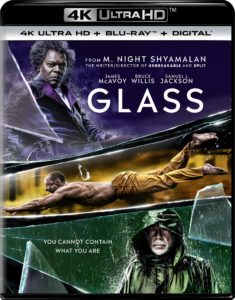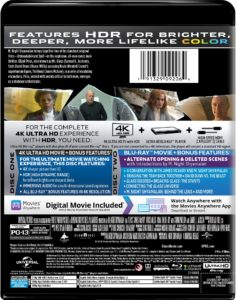 Glass is the third and final installment in a film trilogy that no one was even aware they were watching, until the credits rolled on Split. This movie picks up right where that film left off. Kevin Wendell Crumb (James McAvoy), a man suffering from Dissociative Identity Disorder, has 23 distinctive personalities inside of him, all fighting to come out. However, the one in charge of The Horde is The Beast, a super-human monster and deadly serial killer, who instructs the other personalities to kidnap teenage girls for him to murder. The Horde has been busy, having recently kidnapped and tied up several cheerleaders, preparing them for The Beast.
Glass is the third and final installment in a film trilogy that no one was even aware they were watching, until the credits rolled on Split. This movie picks up right where that film left off. Kevin Wendell Crumb (James McAvoy), a man suffering from Dissociative Identity Disorder, has 23 distinctive personalities inside of him, all fighting to come out. However, the one in charge of The Horde is The Beast, a super-human monster and deadly serial killer, who instructs the other personalities to kidnap teenage girls for him to murder. The Horde has been busy, having recently kidnapped and tied up several cheerleaders, preparing them for The Beast.
Over a decade ago, David Dunn (Bruce Willis) discovered that he was unbreakable. He was the only survivor of a massive train wreck, walking away without so much as a scratch. He later discovered that the man responsible for the wreck was a genius named Elijah Price (Samuel L. Jackson). Price calls himself Mr. Glass, due to the fact that he suffers from an extreme form of brittle bone disease. While David may be invincible, Mr. Glass is the complete opposite…the supervillain to David’s superhero. Under the cover of darkness, David dons a raincoat and patrols the city streets for evil-doers as The Overseer. Providing him with technical and communication support is his now grown up son Joseph (Spencer Treat Clark). These days, Dunn is on a quest to find The Beast, the creature that has been slaughtering many young females.
Once David finally does track down The Beast, he realizes that he has fallen into a trap. Dr. Ellie Staple (Sara Paulson), a psychiatrist who specializes in a particular type of delusion—people who believe they are superheroes—captures the two men. She takes them to Raven Hill Memorial Psychiatric Hospital, where she plans to either cure them of their delusions, or surgically fix the problem with a lobotomy. In order to keep The Horde at bay, she has set up a series of strobe lights in Kevin’s room. The flashing of the lights causes different personalities to come to the surface. Meanwhile, David’s room is equipped with 46 high pressure water nozzles that are connected to a huge water tank outside the building. David may be invincible, but his Kryptonite, if you will, is water. Elijah Price has also been transferred to the facility, but he is in a mostly vegetative state, unable to do much of anything…or is he?! As Ellie tries to get the men to admit to their delusions and submit to her treatment, Mr. Glass appears to be up to something. Despite his vegetative state, the criminal mastermind always seems to get out of his room and is found sitting in his wheelchair in other parts of the building.
The film is primarily focused on exploring these three characters in more detail, providing a bit more of a backstory for the characters, particularly Kevin and Elijah, and more closely linking their stories to David’s. In the process, the film brings back one character that is close to each of these men. For David it is his son Joshua, for Elijah it his mother (Charlayne Woodard), and for Kevin it is Casey Cooke (Anya Taylor-Joy), one of the young women who had been kidnapped by The Horde in Split, and the only victim to escape The Beast alive, thanks to her befriending and bonding with Kevin and some of the other personalities. In this film we are also introduced to several more of Kevin’s personalities as well as revisiting some familiar ones.
Glass builds to a big final act/showdown which is shot in an exciting way using handheld cameras to put the viewer right into the action. Of course, the film also includes another one of Shyamalan trademark twists at the end. I think the ending will very divisive. I personally did not find it to be very satisfying, but know of others who did. While the ending does leave open the possibility of more follow-up films, it does provide closure to these characters and the franchise (whether you find the way it does satisfying or not is up to you).
I was not a fan of Unbreakable…I didn’t care for it when I first saw it in the theater, and felt the same way when I recently re-watched it. On the other hand, I thoroughly enjoyed Split—while it linked to Unbreakable at the end, it never felt like a comic book film. It was much more of a straightforward thriller, featuring an amazing performance by James McAvoy. Glass falls somewhere in-between these two. There is this excellent thriller aspect with the creepy mental hospital and the mystery of what Mr. Glass is up to. However, like Unbreakable, it also relies heavily on self-referential comic book tropes as Mr. Glass tries to prove to the other characters and the world that comic book heroes and villains are actually based in reality. Instead of trusting that the audience will get this, the writers are constantly bashing the viewer over the head with this meta exposition. At various points in the movie, both Mr. Glass and his mother go on these long soliloquies, over-explaining how the events the characters are going through align with comic book tropes. The writers are constantly making sure that the viewer is aware that this is a comic book movie—there is little faith that the audience can figure this out on their own. That said, McAvoy is once again the highlight of the film. The way he seamlessly flows between personalities is amazing, and each one feels like his or her own unique, well fleshed out character. And the final showdown between these three characters is done in an exciting, visceral way.
Universal’s 4K Ultra HD release looks and sounds amazing. Each character his own color pallet—greens for David, purples for Mr. Glass, and yellows for The Horde/The Beast, and these really stand out thanks to the HDR-enhanced picture. This is especially noticeable in the rose-colored examination room where Dr. Staple interviews her patients. Faces, clothing and textures also receive an uptick in detail in the 4K picture. The Dolby Atmos soundtrack can be a little overly aggressive and booming at times, but it does add to the excitement, and does an excellent job of making the viewing experience a really immersive one. This is especially noticeable in scenes where you hear the rain and thunder overhead, and feel like you should be trying to find cover.
The 4K Ultra HD release comes packed in standard UHD keepcase with a slipcover, and contains an insert with a code to redeem for a 4K Movies Anywhere digital copy of the film. While not included in the 4K release, the back of the digital code insert in the Blu-ray release also includes a code for a bonus free digital movie. Both the 4K and Blu-ray discs contain the same assortment of bonus material, which includes about 30 minutes of deleted scenes with introductions from the director, and about 38 minutes of interviews and behind-the-scenes featurettes with the cast and crew.
What’s Included:
-
4K Ultra HD:
- 2160p / Widescreen 2.39:1
- HDR10
- Audio: English Dolby Atmos, Spanish 5.1 Dolby Digital, French 5.1 Dolby Digital
- Subtitles: English SDH, Spanish, French
- 1080p / Widescreen 2.39:1
- Audio: English Dolby Atmos, English Descriptive Video Service, Spanish 5.1 Dolby Digital, French 5.1 Dolby Digital
- Subtitles: English SDH, Spanish, French
- 4K Digital copy redeemable via Movies Anywhere
- Bonus Digital Movie (Redemption Deadline 9/22/2019)
ONLY INCLUDED IN BLU-RAY RELEASE
Additional bonus digital movie redeemable at www.upherewards.com. At the time of this review, the list of available titles includes Charade, Jarhead 2: Field of Fire (Extended Version), Mallrats, Slapshot, Vertigo and Pillow Talk, but these change every 4 months or so.
Blu-ray:
Digital (for redemption deadline, see NBCUcodes.com):
Extras:
All of the bonus material can be found on both the 4K Ultra HD and the Blu-ray discs.
- Alternate Opening (2:57)
In the optional introduction by M. Night Shyamalan, the director explains that the original concept was to have the entire movie take place in the psychiatric hospital, so this alternate opening is footage of the hospital being set up for the arrival of its new residents. - Deleted Scenes (24:53)
Collection of 12 deleted scenes with optional introductions by director M. Night Shyamalan. The explanations of the scenes are often longer than the scenes themselves. Play All, or select from:- David Alone at Bar (1:42)
A glimpse into David’s lonely life when he’s not out looking for injustice. - Patricia Talks to Cheerleaders (3:41)
Longer version of the scene when Patricia talks to the abducted cheerleaders. - David Encounters Pierce (1:34)
Hospital employee Pierce meets David for the first time. - Casey in Art Class (1:41)
Scene showing that Casey is now more confident and self-assured after the events of Split, willing to stand up in front of the class and explain her artwork. - Dr. Staple Explains Machine (1:49)
Dr. Staple explains the lobotomy machine to Pierce. - Mrs. Price in Waiting Room (1:24)
Mrs. Price is interviewed by Dr. Staple. - Mrs. Price Talks to Elijah (2:01)
Mrs. Price gives a monologue to her son, despite the fact that he’s in a vegetative state and can’t respond. - Dr. Staple Drinks Tea (1:50)
As Dr. Staple drinks tea on the steps of the hospital, a creepy patient points and laughs at her. - Pierce Checks Elijah’s Room (1:55)
Another scene where Elijah is messing with metal hospital employee Pierce. - Mrs. Price Tells Elijah About Surgery (2:10)
Elijah signals to his mother that he’s faking his vegetative state. - David Submits to Dr. Staple (2:01)
David just wants to be with his son, and contemplates allowing Dr. Staple to perform the procedure on him. - Patients Worship The Beast (1:48)
The other mental patients see the beast as a god.
- David Alone at Bar (1:42)
- The Collection of Main Characters (8:43)
Director/writer/producer M. Night Shyamalan and the cast talk about the characters and the actors who portray them. Includes behind-the-scenes footage, and interviews with actors James McAvoy (“Kevin Wendell Crumb”), Samuel L. Jackson (“Elijah Price”), Sarah Paulson (“Dr. Ellie Staple”), Anya Taylor-Joy (“Casey Cooke”), Charlayne Woodard (“Mrs. Price”) and Spencer Treat Clark (“Joseph Dunn”). Play All, or select from:- David Dunn (1:53)
- Elijah Price (1:58)
- Kevin Wendell Crumb (2:56)
- The Rest of the Family (1:59)
- A Conversation with James McAvoy and M. Night Shyamalan (5:10)
Star James McAvoy and director/writer/producer M. Night Shyamalan sit down to discuss the movie, including its unique and original tone, playing this DID character a second time around, the new personalities, and more. - Bringing the Team Back Together (2:54)
The cast and crew talk about the family-like nature of the set. Includes interviews with director/writer/producer M. Night Shyamalan, first assistant director/co-producer John Rusk, key grip Jon Sibert, A camera second assistant Leon Sanginiti, Jr., scenic charge Nell Stifel, producer Jason Blum, and stars Samuel L. Jackson, Spencer Treat Clark, James McAvoy, Charlayne Woodard, Anya Taylor-Joy & Sarah Paulson. - David Dunn vs. The Beast (2:11)
A behind-the-scenes look at the huge face-off between David Dunn and The Beast. Includes interviews with producer Jason Blum, executive producer Steven Schneider, director/writer/producer M. Night Shyamalan, stunt coordinator Manny Siverio, and star James McAvoy. - Glass Decoded (2:52)
Director/writer/producer M. Night Shyamalan talks about some of the props and color schemes that are used consistently across the three movies of the trilogy. - Breaking Glass: The Stunts (1:28)
A look at some of the film’s big stunts. Includes behind-the-scenes footage and interviews with stunt coordinator Manny Siverio, director/writer/producer M. Night Shyamalan, and star James McAvoy. - Connecting the Glass Universe (2:54)
The cast and filmmakers talk about joining the styles, stories and characters from two very different films for this third film, which explores the concept of What if comic-books were based in reality. Includes behind-the-scenes footage and interviews with director/writer/producer M. Night Shyamalan and stars Samuel L. Jackson, Sarah Paulson, James McAvoy, Spencer Treat Clark & Anya Taylor-Joy. - M. Night Shyamalan: Behind the Lens (2:46)
The cast and filmmakers talk about working with director/writer/producer M. Night Shyamalan. Includes interviews with producer Ashwin Rajan, storyboard artist Brick Mason, producer Marc Bienstock, producer Jason Blum, and stars Anya Taylor-Joy, Sarah Paulson, James McAvoy & Spencer Treat Clark. - The Sound of Glass (1:50)
Composer West Dylan Thordson discusses how he created the score for the film, including recording some of the music on-location in the hospital. Also includes comments from director/writer/producer M. Night Shyamalan. - Enhancing the Spectacle (2:53)
The filmmakers discuss and demonstrate how visual effects were used to enhance the performances and narrative of the film. Includes behind-the-scenes footage, and interviews with visual effects executive producer Bob Lowery, visual effects supervisor Ruben Rodas, senior visual effects supervisor Edwardo Mendez, CG supervisor Dan Bornstein, and director/writer/producer M. Night Shyamalan. - Raven Hill Memorial (2:16)
The cast and filmmakers talk about filming in the creepy, defunct, abandoned mental hospital. Includes behind-the-scenes footage and interviews with director/writer/producer M. Night Shyamalan production designer Chris Trujillo, location manager Staci Hagenbaugh, producer Marc Bienstock, and stars Samuel L. Jackson, Anya Taylor-Joy & Sarah Paulson. - Night Vision (1:56)
The cast and filmmakers talk about using storyboards to plan and hone down the film at an early stage. Includes some storyboard-to-final-shot comparisons, behind-the-scenes footage, and interviews with storyboard artist Brick Mason, producer Jason Blum, director of Pphotography Michael Gioulakis, director/writer/producer M. Night Shyamalan, and star Sarah Paulson.
Final Thoughts:
Overall, I found Glass to be a pretty solid final chapter to this trilogy of films even if it did not meet my overall expectations. It was interesting to see these two very different worlds collide—one a comic book film about superheroes and supervillains, and the other a thriller about a serial killer. At times I found the meta comic-book stuff a bit too heavy-handed, but the big showdown in the final act is quite exciting and visceral. The film’s ending will be a bit divisive, but the movie is definitely worth checking out for fans of Unbreakable and/or Split. Universal’s 4K release looks and sounds excellent, and includes over an hour of deleted scenes and interviews with the cast and crew.









